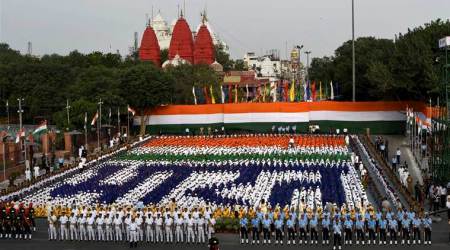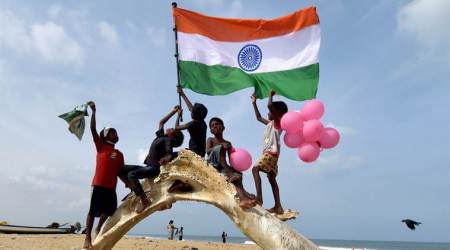 India is a byword in every Afghan household when it comes to matters of energy, higher education, rural development, medicine, medical tourism, food, TV dramas, and of course Bollywood.
India is a byword in every Afghan household when it comes to matters of energy, higher education, rural development, medicine, medical tourism, food, TV dramas, and of course Bollywood.
India celebrates her 70th year of independence alongside the confidence and strength to project power more than ever before. This for Afghanistan is cause for jubilation. For us Afghans, India is not only a country and an ancient civilization but a contemporary brand too. An iconic brand representing diversity, tolerance, culture, humility, deep knowledge amid humility and a sincere friend.
India is a byword in every Afghan household when it comes to matters of energy, higher education, rural development, medicine, medical tourism, food, TV dramas, and of course Bollywood. The advent of cinema in Afghanistan from the very beginning has been synonymous with Indian actors, actresses and movie songs. Afghans used to, and perhaps still do, associate themselves with the age and era of Bollywood stars and the themes and issues of their movies. This is not due to lack of alternatives or options, but because of the vast similarities between our peoples.
During the 1980s, after the invasion of Afghanistan by the former Soviet Union, we were incentivized to watch Soviet movies, but the effort failed. Bollywood continued to play a dominant role in our lives. The rise and fall of Indian film stars continue to make headlines in Afghanistan. All India Radio’s Dari programme was most popular both in urban and rural Afghanistan, prior to the cyber revolution.
India’s post-Independence magic has been the unity of her ‘Amars, Akbars and Anthonys.’ All her children found their home, and under one ceiling embraced their lost mother, while retaining and celebrating their diversity of beliefs and skills. They were all synced to one script and sang ‘Jai Hind !’
We have learned and continue to learn a lot from India, but the best lesson we can learn from India is the lesson and experience of diversity under one ceiling and deep attachment to the idea of one soil, one country and several identities in one nationality.
Many thousands of Afghans who have studied in India and continue to pursue their higher studies return home with the experience of radically diverse – and possible divisive – issues such as race, language, rights of constituents, state legitimacy , rule of law, history and best practices to contribute to the rebuilding of their nation and country. In India they learn the art of contribution, peaceful struggle, to do more with less and the ability to master obstacles through endurance, devotion and humility.
India discovered the number Zero which is hardly appreciated worldwide, but the fact is that we can’t live without it for a day. India’s relevance in our lives is as vivid as her various discoveries during the course of history.
The venom of partition in 1947 created a physical distance between our two countries but with modern ways of connectivity we have been able to come closer than ever before. India’s relationship with Afghanistan has been based on the principle of care and share, a development partnership without caveats and unconditional support for democratic and constitutional process.
As we see it from here, strengthening the state-to-state relationship is the core pillar of India’s bilateral relationship with Afghanistan. Based on this valued and cherished principle India declined to minimize her relationship with the Afghan government in 1996 when Kabul was overrun and captured by the Pakistan-backed Taliban, Al-Qaeda, JUI (Jamiat Ulema Islam) & other militant groups.
It set a precedent in the post-Soviet era that sheer force and violence shouldn’t dictate the fate of multi ethnic and diverse societies and that proxy wars should face and result in a dead end. With India’s political and meagre financial assistance, the anti Taliban resistance continued to hold on and thus prevent Afghanistan becoming a de-facto colony of Pakistan through creeping invasion.
That slice of history, from 1996-2001, known as the era of resistance in Afghanistan, evolved around the sacrifices of the Afghan people who defended their unique identity and rejected Pakistan-backed religious dogmatism and militancy. It is yet another hallmark of our shared vision for peace & security and standing against injustice and domination.
Unlike what is sometimes propagated India has never asked Afghanistan to be her ally against others, has encouraged and supported an Afghanistan-owned peace settlement and has shown visible and solid respect to the diversity and fabric of Afghan society.
India’s respect for Afghanistan has generated reciprocal respect. Thus, India remains the most liked and favored country throughout Afghanistan. India has become richer, stronger and far more confident and is assuming its rightful & historic place in the region. We dream to assume our rightful place in the region as well.
Afghanistan has indeed been a crossroad of civilizations and cultures. We are mindful and cherish our Buddhist, Zoarastarian, Hindu and Islamic heritage. The divergence and congregation of all these magnificent civilizations in Afghanistan has not been a coincidence of history. Our location served as an unavoidable magnet for connectivity, divergence of civilizations & settlement of ideas. We want to get back to our roots and resist the axe that wants to divide us Afghans. Much before the dark era of the Taliban or the Cold War, we are searching for and want to revive our historic roots as well.
In this endeavor, India can do far more with and for Afghanistan. Afghanistan in not in search of a new identity. We are defending an identity that some in our neighborhood have tried to snatch from us, corrupt and belittle us with madrassa-born ideologies. We, however, are confident that we will prevail in this conquest.
Afghanistan is not offering itself as an ally to one power against the other. It is trying to emerge as a contributor to peace andvsecurity in the region and not as a spoiler or a launching pad for one neighbour against the other. Afghanistan’s potential remains unexploited and unopened. We are looking to transform from being a country dependent on foreign aid and susceptible to the dark influence of our neighbors, to a hub of friendship, connectivity, trade, tourism & tolerance. It may seem a distant dream but we are moving steadily towards that direction. That has been our status in the past.
We want to change today’s reality. Today much of Afghanistan’s fresh fruits rot in storages or in the back of trucks, as every year Pakistan closes its border for our produce and denies us land access to India. On the other hand India is ready to buy all our fresh agriculture produce. An air corridor was recently established between Kabul and Delhi to solve the problem. Our restricted access to Karachi port pushed us to find alternatives and today Afghanistan is linked to more ports than it has ever been.
Today we are a land-linked country, not a landlocked one. But for the new realities and for us to utilize them properly, more time and adaptability is needed. It is calculated that with the opening of Chabahar port in Iran, Afghanistan’s long dream of unhindered access to the sea can be realized, while trade between India and Afghanistan sees much more genuine growth.
The future is ours. We need the foresight and determination of our leaderships to propel us to a new place of mutual benefit.

